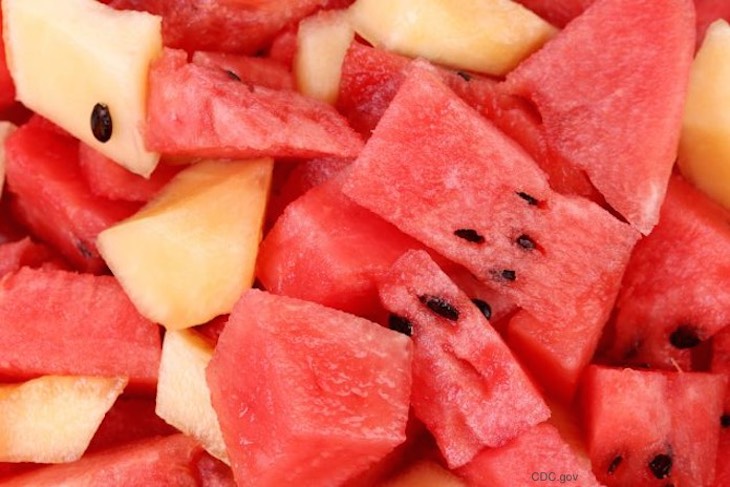The Salmonella Carrau outbreak that is linked to precut melon products sold at Target, Walmart, Kroger, and other stores has prompted questions about prepared produce. And unfortunately, the history of prepared produce outbreaks is long.

Any food can be contaminated with pathogens. The fruits and vegetables can pick up bacteria in the fields, during harvest, during transport, and during processing. While people don’t naturally think of produce as a cause of outbreaks, Salmonella in produce is in the top ten pathogen-food combinations that cause food poisoning.
And in our modern food production and distribution system, produce that is harvested around the world is brought to huge central processing centers. The fruits and vegetables are cleaned and cut and packaged together. That means that just a few pieces of contaminated melon, some heads of lettuce, or broccoli or cauliflower can contaminate an entire batch. And that batch is sold in grocery stores all around the country.
We asked attorney Fred Pritzker, who has filed lawsuits on behalf of clients sickened by prepared produce, about these outbreaks. He said, “All ready to eat foods carry some risk because there is no kill-step that assures that the product is free of dangerous bacteria. Traditionally, risk prevention focused on ready to eat meat and poultry products but we have seen that produce is just as likely to be contaminated.”
Here is a selected list of food poisoning outbreaks linked to prepared and precut produce:
- In 2011, an E. coli O157:H7 outbreak that sickened 58 people was linked to romaine lettuce included in salad bars at a chain grocery store.
- In 2012, an E. coli outbreak linked to a bagged spinach and spring mix sold at Walgreens sickened at least 33 people in 5 states.
- In 2013, an E. coli O157:H7 outbreak that sickened 33 people in 4 states was linked to Trader Joe’s Glass Onion ready-to-eat salads.
- Also in 2013, a hepatitis A outbreak that sickened 162 people was linked to frozen mixed berries produced by Townsend Farms.
- In 2014, a deadly Listeria monocytogenes outbreak that sickened at least 35 people was linked to Bidart Brothers caramel apples. Research showed inserting a stick into the apple made the fruit more susceptible to bacterial contamination.
- In 2016, another hepatitis A outback linked to frozen strawberries sickened at least 143 people. The berries were used to make smoothies at Tropical Smoothie Cafe restaurants in the eastern United States.
- Also in 2016, a Listeria monocytogenes outbreak linked to Dole packaged salads sickened 19 people and caused one death in Michigan. Fourteen people in Canada were also sickened in that outbreak.
- In 2018, two cyclospora outbreaks linked to prepared produce sickened hundreds. An outbreak linked to McDonald’s prepared salads sickened 511 people in 16 states. And another separate cyclospora outbreak linked to Del Monte vegetable trays sold at Kwik Trip locations sickened 250 people.
- Two E. coli O157:H7 outbreaks linked to romaine lettuce sickened hundreds of people in 2018. In one of those outbreaks the CDC took the extraordinary step of telling consumers to avoid eating all forms of romaine lettuce, including lettuce in bagged salads mixes, until more information was uncovered.
- A Salmonella Sandiego outbreak linked to HyVee Spring Pasta Salads sickened at least 101 people.
- Also in 2018, a Salmonella Adelaide outbreak linked to Caito Foods precut melons sickened at least 77 people in nine states.
The current food poisoning outbreak linked to prepared produce is the Salmonella Carrau outbreak officials have linked to precut melon products made and distributed by Caito Foods. They are sold under the brand names Renaissance Food Group, Boar’s Head, Garden Highway, Trader Joes, Freshness Guaranteed, and Whole Foods Market.
So how can you protect yourself against food poisoning caused by prepared fruits and vegetables? First, stay informed about current recalls and outbreak notices. Second, follow Brendan’s advice when you buy these products. Third, buy prepared produce that is marked with an expiration date that is as far into the future as possible. And fourth, keep the fruits and veggies refrigerated, which can help slow bacterial growth. Finally, know the symptoms of food poisoning so you can get help if you need it.




